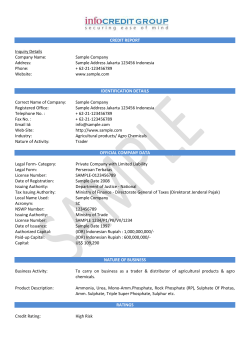
View/Open - Hasanuddin University
The Indonesian Plywood Industry: Market and future prospects 1. Makkarennu Faculty of Forestry Hasanuddin University, Indonesia Abstract Since the mid-1980s, Indonesia has emerged as one of the biggest plywood suppliers in the world. Indonesian plywood has dominated many major markets around the world. However, due to economic crisis in 1997/1998 and other factors, the industry experienced a decline in overseas markets, which in which influenced the production and trade sectors. The objectives of this study were to analyze market and future prospects of Indonesian plywood industry. For the purpose of the study, data export of the plywood to sixteen countries for five years (2008-2012) and data export to Japan for thirty-one years (1982-2012) were collected. To predict the demand market of Indonesian plywood around the world, including in Japan, the obtained data was analyzed by using exponential smoothing model. Mean Absolute Percentage Error (MAPE) and Mean Squared Error (MSE) are also used to calculating demand sales forecast accuracy. The most prospective market of Indonesian plywood is Japan (1.09 million m3 until 2017) followed by China and Saudi Arabia. Keywords: plywood, market and consumption Introduction Forests have been an important contributor to growth, establishing Indonesia as a world leader in the export of tropical forest product. In rural areas, forestry and forest industries are even more important contributors to the regional economy. The industrial country has absorbed the plywood from development country such as Indonesia. This trend has exploited the tropical rainforest and required attention for conservation field. The industry was developed to add value to raw material, to help industrialization, and to provide employment (ITTO, 2011). In 1990s, the government policies relating to the forestry industry have spurred highest growth of timber industry and reached its peak. Indonesian plywood industry was set up in the later part of the 1960s and began to develop rapidly in 1980s, when the government issued a policy requiring every forest concessionaire to establish a wood-processing plant. This policy was followed by on the banning of logs export in 1985. The banned log exports giving subsidies for plywood export to new markets especially to Japan and Korea. The policy made Indonesia one of the biggest plywood suppliers in the
© Copyright 2025















